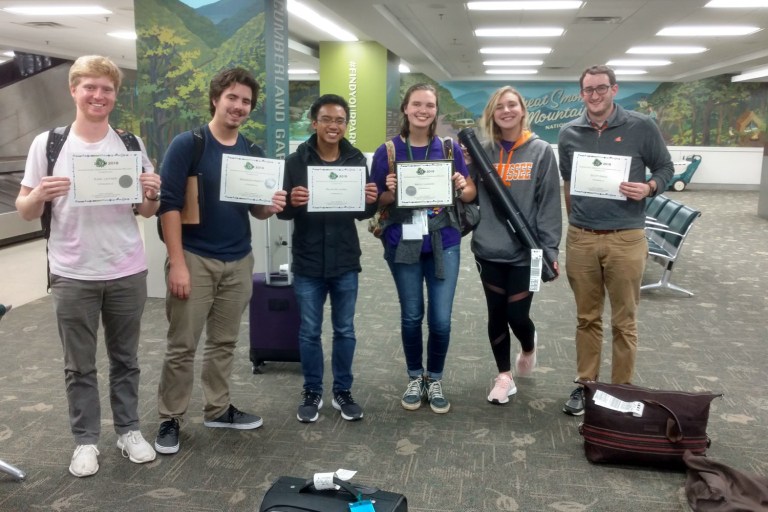
The UT iGEM team after returning home from the 2018 International Genetically Engineered Machine (iGEM) Giant Jamboree.
A group of six UT students won a silver medal for their performance in the 2018 International Genetically Engineered Machine (iGEM) Giant Jamboree, an international competition for students interested in synthetic biology.
The undergraduate students who represented UT are:
- Scott Dixon, of Franklin, Tennessee, a senior in chemical and biomolecular engineering
- Brandon D. Kristy, of Knoxville, a sophomore in entomology and plant pathology
- Molly E. Landon, of Oak Ridge, Tennessee, a senior in chemical and biomolecular engineering
- Ralph B. Laure, of Smyrna, Tennessee, a senior in chemical and biomolecular engineering
- Karl D. Leitner, of Brentwood, Tennessee, a senior in biochemistry and cellular and molecular biology
- Morgan T. Street, of Johnson City, Tennessee, a sophomore in chemical and biomolecular engineering
The UT group competed against 342 other teams—roughly 6,000 participants—from 42 countries. They shared the silver medal with Yale University.
“I think it speaks volumes of the high quality of our undergraduate students,” said Frank Loeffler, UT-Oak Ridge National Laboratory Governor’s Chair for Microbiology and Civil and Environmental Engineering, who was one of the team’s faculty advisors.
The UT iGEM team prepared for eight months for the competition. Their project studied possible ways to break down two of the most common environmental toxins: dichloroacetate (DCA) and dichloromethane (DCM).
DCA is a byproduct of water chlorination that is commonly found in drinking water. Researchers have been studying its use to treat life-threatening conditions such as cancer and certain types of genetic diseases.
Volcanoes and oceans naturally produce DCM. However, the largest source of DCM is industrial emissions, and it is currently listed as a significant threat to the ozone layer.
Understanding how microorganisms in DCM and DCA degrade can generate new opportunities for environmental cleanups, safeguard environmental and human health, and protect the ozone layer, said Loeffler.
“These efforts can help advance new technologies to improve the purification of drinking water, develop more efficient remedies for cleaning up contaminated aquifers, and improve predictive models to protect the ozone layer,” he explained.
Currently, the UT iGEM team has members from the Departments of Biochemistry and Cellular and Molecular Biology, Chemical and Biomolecular Engineering, Civil and Environmental Engineering, Microbiology, and Entomology and Plant Pathology, as well as the Bredesen Center for Interdisciplinary Research and Graduate Education.
This year marks the third time the UT iGEM team has competed at the Giant Jamboree, which is held in in Boston, Massachusetts. The competition was created in 2006 by the Massachusetts Institute of Technology as a way to engage students in exploring synthetic biology.